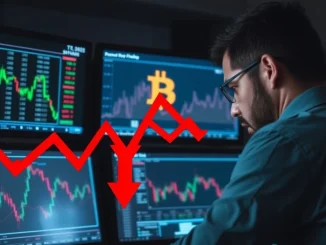
In the fast-paced world of cryptocurrency, staying informed about global economic shifts is key. While it might seem distant, news concerning international trade agreements can have significant ripple effects on market sentiment and capital flows. A recent report suggests that **US Trade Agreements** with key Asian partners are nearing completion, a development worth watching.
What’s Happening with US Trade Agreements?
According to sources cited by Walter Bloomberg on X, the United States is reportedly close to finalizing trade tariff agreements with both Japan and South Korea. This isn’t just standard diplomatic chatter; these potential agreements involve trade tariffs, which are essentially taxes on imported goods. Such measures can influence everything from consumer prices to international supply chains.
Think of it like this:
- Tariffs can make imported goods more expensive.
- They can protect domestic industries but potentially harm those reliant on imports.
- Negotiating them involves balancing national interests and international trade relationships.
Why Does the Japan South Korea Trade Deal Matter?
Japan and South Korea are major economic players and significant trading partners for the United States. Finalizing a **Japan South Korea Trade Deal** involving tariffs could have substantial implications for various sectors, including technology, automotive, and manufacturing. These are industries deeply intertwined with the global economy.
A successful agreement could signal:
- Improved trade relations and stability.
- Potential adjustments in the flow of goods and services.
- A positive signal for investor confidence regarding predictability in international commerce.
Conversely, delays or disagreements could introduce uncertainty.
Understanding the Trade Tariffs Impact
The primary **Trade Tariffs Impact** is on the cost of goods. When tariffs are imposed or adjusted, they change the economic calculus for businesses and consumers. For instance, a tariff on imported electronics might make domestically produced alternatives more competitive, or it might simply raise the price for consumers if there’s no domestic alternative.
Consider these potential effects:
- Changes in import/export volumes.
- Inflationary or deflationary pressures on specific goods.
- Shifts in manufacturing locations or supply chain strategies.
- Impact on corporate earnings for companies involved in international trade.
These micro-level impacts can aggregate into broader economic trends.
The Broader Global Economic Impact
When major economies like the US, Japan, and South Korea adjust their trade policies, it sends ripples across the world. The **Global Economic Impact** of these agreements isn’t limited to just the countries involved. Stable trade relationships between these nations contribute to overall global economic stability, which is often viewed positively by financial markets.
Conversely, trade disputes or unpredictable tariff changes can:
- Increase market volatility.
- Reduce investor confidence.
- Slow down global economic growth.
This interconnectedness means that even news about specific bilateral agreements can influence the broader financial landscape.
What This Means for the Cryptocurrency Market Reaction
So, how does news about **US Trade Agreements** and their potential **Trade Tariffs Impact** on the **Global Economy Impact** the world of Bitcoin, Ethereum, and other digital assets? The **Cryptocurrency Market Reaction** is often influenced by macroeconomic factors and overall market sentiment.
Here’s the connection:
- Market Sentiment: Positive news about trade stability can boost overall investor confidence across all asset classes, including crypto. Conversely, trade tensions can increase risk aversion, leading investors to move away from volatile assets like cryptocurrencies.
- Inflation/Deflation: Trade tariffs can affect the price of goods, potentially contributing to inflation or deflation. Cryptocurrencies, particularly Bitcoin, are sometimes viewed as hedges against inflation, so changes in inflationary expectations can influence crypto demand.
- Capital Flows: Changes in global trade dynamics can affect where capital flows internationally. Shifts in investment patterns driven by trade agreements could indirectly influence liquidity in various markets, including crypto.
- Economic Growth: To the extent that these agreements foster or hinder economic growth, they can affect the disposable income and institutional investment interest that flows into the crypto space.
While not a direct, one-to-one correlation, the health and stability of the global economy provide the backdrop against which the crypto market operates. News suggesting smoother trade relations between major economies is generally seen as a positive for overall market stability.
Actionable Insights for Crypto Holders
Given this potential development, what should a cryptocurrency enthusiast or investor consider?
- Stay Informed: Keep an eye on how these trade negotiations progress and the market’s reaction.
- Understand Macro Links: Recognize that crypto markets don’t exist in a vacuum; they are increasingly influenced by global economic and geopolitical events.
- Assess Your Risk Tolerance: Global news can increase volatility. Ensure your portfolio aligns with your comfort level for risk.
- Look Beyond the Headlines: Understand the potential *impact* rather than just reacting to the initial news byte.
Conclusion
The reported nearing of **US Trade Agreements** with Japan and South Korea, particularly concerning trade tariffs, is a development with potential **Global Economic Impact**. While not directly about blockchain or digital currencies, such significant shifts in international trade policy can influence the broader financial ecosystem and market sentiment. Understanding the potential **Trade Tariffs Impact** and its connection to the overall economy is crucial for navigating the often-unpredictable **Cryptocurrency Market Reaction**. As these agreements potentially finalize, observing how traditional markets and investor confidence respond will offer valuable insights for the crypto space.



